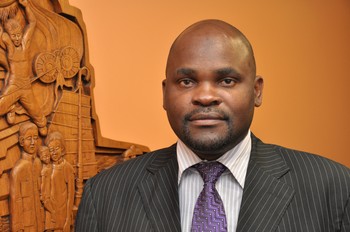Twelve international peacemakers from around the world are visiting congregations, presbyteries and colleges of the Presbyterian Church (U.S.A.) Sept. 19-Oct. 12.
They are sharing their stories about church-based ministries in their countries that seek peace justice and pursue peace in the name of Jesus Christ. This year’s international peacemakers come from Colombia, Egypt, Ethiopia, Jamaica, Madagascar, Malawi, Mexico, Palestine, the Philippines, Russia, South Sudan and Syria.
The International Peacemaker program is sponsored by the Presbyterian Peacemaking Program.
Moses Makandawire is director of church and society for the Central Church of Africa Presbyterian’s Livingstonia Synod, which serves northern Malawi. He has helped design and implement election projects in his country and has served as an election observer in the Democratic Republic of Congo, southern Sudan, Mozambique, South Africa, Zimbabwe, and Tanzania. He has written and presented papers on good governance, issues related to peace and conflict, human rights, and democracy.
What is the most important situation in your country that you will be addressing?
I’m mostly focusing on Malawi’s governance and politics. America, to a large extent, has been the main promoter of the democratic system of governance. Here you are able to make government accountable. In the United States, proper systems and structures are in place that benefit the people. In Malawi we lag behind. Since independence, we have not been able to move out of poverty. We have experienced conflict due to corruption, political, patronage, discrimination, and lack of human rights.
How are the faith communities trying to address this situation?
There are a number of strategies. We take a very holistic approach to the evangelization process. We cannot just preach to people who are hungry, have no water, and have no rights. We have social services along with evangelism presentations. We also promote human rights through civic education. We encourage people to make government accountable. We do advocacy for policy reforms and legislative reforms.
What peacemaking lessons from your situation are you trying to communicate to U.S. Presbyterians?
One of the biggest challenges around the world is the idea that an absence of guns means peace. When you empower people, you are preventing violent conflicts that might erupt due to no access to resources. Preventive programs are very important. Conflict resolution should be the last resort.
What is the primary message you want to communicate to U.S. Presbyterians about your country?
Let us not delay in supporting colleagues who are less privileged. Let’s continue exchange programs. Let the American people come to our country and share our experiences and our hopes and support positive policies in the U.S. government and oppose bad policies and actions. Together, we can work for peace and justice in the world so there is fairness and so that all can enjoy fundamental rights.
Makandawire’s itinerary includes visits to Grace, Mission, Shenango, and Great Rivers presbyteries.
Pat Cole is a communications associate with the Presbyterian Mission Agency.

